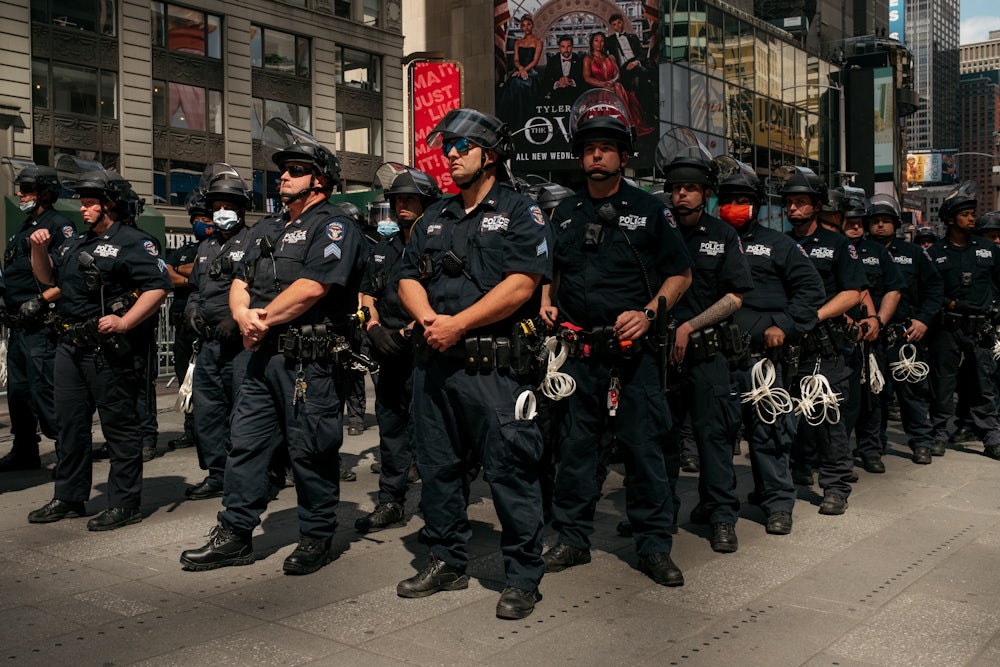The staggering excess of the New York Police Department, the largest municipal police force in the country, is hard to hide at this point. The NYPD commands 36,000 officers, a bloated budget of nearly $6 billion that the mayor all but refuses to touch, and a reserve of military-grade equipment collected in the name of anti-terrorism, including machine guns and armored vehicles. Since last Friday, the police have met ongoing protests in New York over police violence and the murder of Minneapolis resident George Floyd with grotesque displays of might, including near-constant air surveillance and ranks of officers in state-of-the-art riot gear assaulting protesters in the streets. On Wednesday, the city’s Civilian Complaint Review Board said it had received more reports of police misconduct in the previous five days than it had in all of April.
The expanse of shields, riot batons, and ballistic vests routinely dispatched to contain civilian demonstrators is even more bleak in light of the dire shortages—of supplies, money, and basic necessities—that other workers have had to endure during the pandemic. Barely a month ago, health care professionals and other essential workers were still pleading for enough masks and other personal protective equipment. In March, as the coronavirus death toll spiked and hospitals feared they would run short of ventilators, some staffers at Mount Sinai West wore garbage bags in the absence of proper garments. The NYPD, on the other hand, has a $10 million high-tech surveillance helicopter.
Beneath the obscene spectacle of roided-out weaponry is a different, more mundane kind of resourcing that nevertheless also demonstrates the fundamentally antisocial priorities of capitalist allocation. New York police continue to have some of the best employer benefits in America, including those unheard of in almost every other sector since perhaps the postwar era. Last year, the average annual income of police in the New York metro area was a little over $83,000—nothing approaching robber baron money, of course, but far above what EMTs ($45,420), nursing assistants ($38,250), childcare workers ($30,060), or teacher’s aides ($34,380) make. Like other public employees, the police have excellent health insurance with “no deductibles, copays, or premiums”—the goal, to a word, of Bernie Sanders’s Medicare for All plan. NYPD officers also receive unlimited sick leave with full pay and a famously generous pension, deliverable after 22 years of service, which means that a cop could potentially retire around age 42 with a pension worth $1.75 million, according to the NYPD’s recruitment materials. (That’s incidentally a little over what personal finance experts recommend people have saved by the time of retirement; the vast majority of civilians, as you can probably guess, fall short.) Finally, that compensation (and far more) is safeguarded by a union so powerful that it regularly bullies city officials with impunity and sneers at public demands for accountability in the wake of officer misconduct, violence, and killing.
The point, though, isn’t that we should think of the living wage, health insurance, pension, paid leave, and union muscle offered by the NYPD as extravagant luxuries. Rather, they’re the exact building blocks of a decent life that have been kicked out from most other American workers precisely while police departments across the nation have swelled. As we’re being asked to imagine a future free from cops, a parallel demand presents itself: to use the money gained from defunding the police to build a future in which cop-style benefits are the standard for all.
The lopsided funding of police departments at the expense of all else has given rise to the kind of inequality that, in turn, produces crises such as homelessness and the opioid epidemic—to which state and local governments typically respond with yet more policing. It’s a venomous snake that continually eats its own tail. “The police department and the corrections department are always hiring and community centers aren’t,” Alex Vitale, author of The End of Policing, told The Nation this week. “And when they do hire, it’s at half the salary and half the benefits. So this budget battle is about getting cities to reprioritize how they deal with the very real needs of the most disadvantaged communities that are subjected to the most intensive policing.”
The sociologist Pierre Bordieu once made a useful distinction between what he called the “left hand” of the state—the social safety net and provisions like public education—and the “right hand” of the state, or the punitive element that includes the police, prison system, and other institutions that function primarily to defend capital. For decades, American economic life has been defined by the retrenchment of the former and the vast expansion of the latter. Like so many other inequalities, the pandemic has only brought that imbalance into sharper relief. “Amid a cataclysmic failure by the state to protect its citizens’ health during the coronavirus pandemic, the United States has doubled down on authoritarianism and a siege mentality, with cops demanding greater levels of impunity,” Myke Cole, a former NYPD intelligence analyst wrote in May.
According to the Economic Policy Institute, as of this week, one in four workers in the U.S. are either receiving or waiting to receive unemployment benefits. Though the economy shows no sign of recovery, and mass unemployment is almost certain to drag on, the additional $600 in benefits granted to workers laid off during the pandemic will expire at the end of July, along with protections from evictions. The eruption of anger and grief in the streets since last week, in other words, is more proof that extreme concentrations and racist stratification of wealth and power inevitably produce extreme social unrest, not least in the wake of catastrophic events. A precinct on fire only shows how we’re long overdue to reverse the course.
